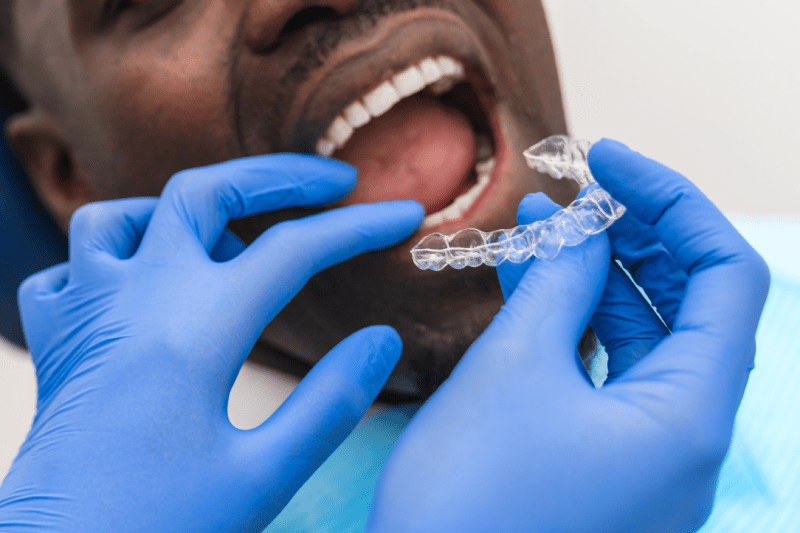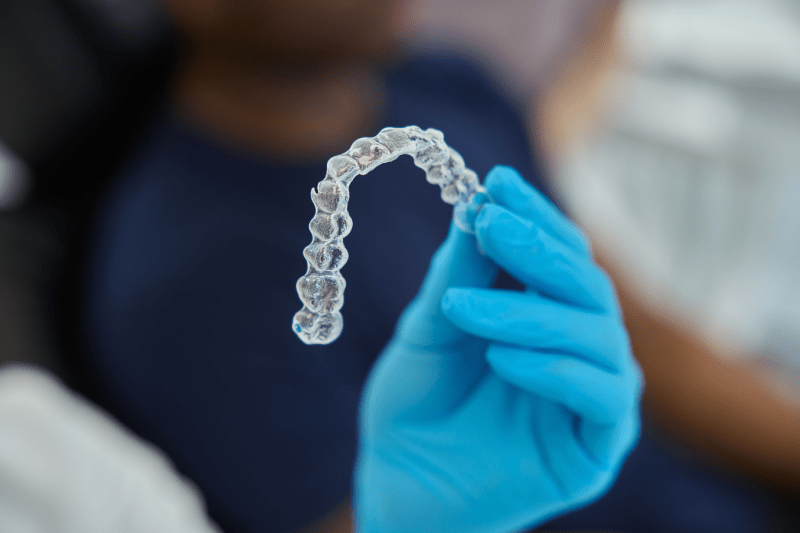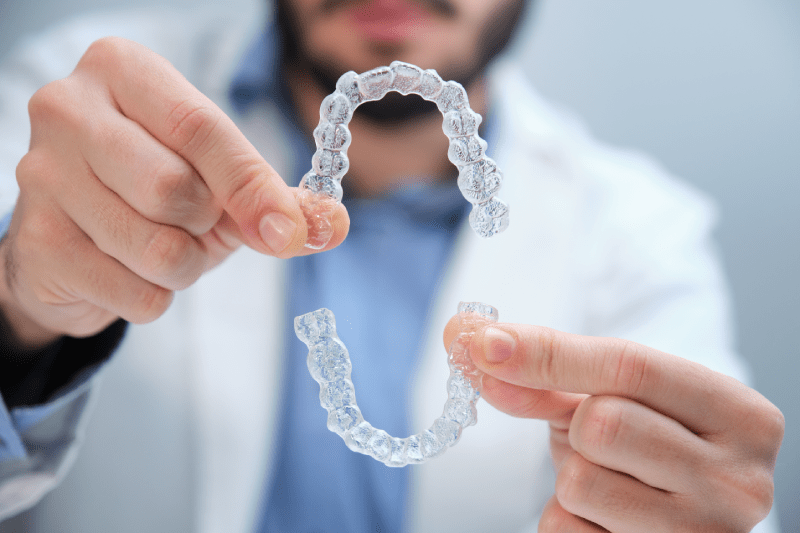Dental Veneers or Invisalign: Which one is Better?: Frequently Asked Questions
Advances in smile aesthetics offer a variety of options for those seeking solutions to issues like crooked teeth, gaps, or discoloration. Two of the most popular methods, Invisalign and dental veneers, have unique features that serve different purposes. This content delves into the differences, similarities, advantages, and disadvantages of these two treatments through 35 of the most frequently asked questions. To learn which method is best for you and to create a personalized treatment plan, you can contact Cure Holiday.
What Is The Fundamental Difference Between Dental Veneers and Invisalign?
Dental veneers are thin porcelain or composite layers bonded to the front surface of teeth. They instantly change the shape, color, and size of the teeth, providing an aesthetic appearance. Invisalign, on the other hand, is an orthodontic treatment consisting of clear, removable aligners that gradually move the teeth into their correct positions. The fundamental difference is that veneers camouflage the appearance of the tooth, while Invisalign actually moves the tooth itself to achieve alignment.

In Which Cases Should Dental Veneers Be Preferred?
Dental veneers are generally preferred for quickly solving aesthetic problems such as discoloration, chips, cracks, misshapen teeth, or gaps between teeth. This treatment is ideal for those who want to permanently change the color of their teeth or close minor gaps. Veneers give the teeth a more symmetrical and aesthetic appearance.
In Which Cases Should Invisalign Be Preferred?
Invisalign is the best solution for correcting orthodontic issues such as mild to moderate crookedness, gaps between teeth, crowded teeth, or jaw alignment problems. Invisalign offers not only an aesthetic but also a functional treatment; it improves chewing function and protects oral health by bringing the teeth into proper alignment.
How Long Does Invisalign Treatment Take?
The duration of Invisalign treatment varies depending on the degree of crookedness. On average, the treatment process is completed within 12 to 18 months. However, in mild cases, this period can be as short as 6 months, while in more complex cases, it can take up to 24 months. The success of the treatment depends on wearing the aligners for at least 20-22 hours a day.
How Long Does It Take to Get Dental Veneers?
Dental veneers provide much faster results than Invisalign. While composite veneers can be completed in a single session, porcelain veneers require a few sessions. In the first session, the teeth are prepared and impressions are taken, and in the second session, the veneers are permanently bonded. The entire process is usually completed within 1 to 2 weeks, providing an instant aesthetic change.
Which Is More Affordable in Terms of Cost?
The cost varies depending on the treatment and the complexity of the case. Generally, the cost for a single dental veneer may be lower than the total cost of Invisalign treatment, depending on whether composite or porcelain is used. However, for a larger number of teeth, the total cost may be higher than Invisalign.
Are Dental Veneers a Permanent Solution?
Dental veneers are not a permanent solution; their lifespan varies depending on the material used. Composite veneers typically last 5 to 7 years, while porcelain veneers can last 10 to 15 years. The lifespan of well-cared-for veneers can be even longer. Veneers need to be replaced when they wear down, crack, or change color.
Are Invisalign Results Permanent?
Yes, the results achieved with Invisalign treatment can be permanent for life. However, to maintain the teeth’s new positions, it is necessary to regularly use aligners called retainers after the treatment. Retainers prevent the teeth from shifting back to their old positions.
Are Teeth Filed Down for Dental Veneers?
For porcelain veneer application, a very small amount of enamel is filed from the tooth’s surface to ensure the veneer has a natural appearance and does not increase the tooth’s bulk. With composite veneers, tooth filing is usually not done or is very minimal. This procedure is irreversible, so it is a permanent decision.
Are Teeth Filed Down During Invisalign Treatment?
No, teeth are not filed down during Invisalign treatment. The treatment uses light, continuous forces applied to the teeth to move them gradually. This process preserves the natural structure of the teeth and does not involve any irreversible changes.
What Is The Biggest Disadvantage of Dental Veneers?
The biggest disadvantage of dental veneers is the irreversible filing of the tooth’s enamel layer. This means that after the veneers are removed, the teeth are left exposed and become sensitive. Since veneers need regular maintenance and replacement, this is a lifelong commitment.
What Is The Biggest Disadvantage of Invisalign?
The biggest disadvantage of Invisalign is that the success of the treatment depends on the patient’s discipline in wearing the aligners regularly. The aligners must be worn for 22 hours a day and are removed when eating, drinking (other than water), or brushing teeth. If the patient is not disciplined enough, the treatment may not yield the desired results.
Do Dental Veneers Solve All Kinds of Dental Problems?
Dental veneers are very effective at solving aesthetic problems like chips, cracks, discoloration, and misshapen teeth. However, veneers do not physically move the teeth. Therefore, they are not suitable for solving orthodontic problems such as severe crookedness or jaw alignment issues.
Does Invisalign Correct Severe Crookedness?
Invisalign is a very effective solution for mild to moderate tooth crookedness. However, it may not be sufficient for very advanced dental and jaw deformities. In such cases, traditional braces or surgical interventions may be more appropriate. Your dentist will evaluate whether your case is suitable for Invisalign.
Are Dental Veneers Painful?
During the dental veneer procedure, local anesthesia is applied due to the filing of the tooth’s enamel layer. This prevents you from feeling pain during the procedure. It is normal to experience slight sensitivity for a few days after the procedure.
Does Invisalign Cause Pain?
Invisalign aligners can cause a feeling of slight pressure and discomfort as they slowly move your teeth. This is usually experienced within the first few days of switching to a new set of aligners and passes quickly. It is generally a much less painful method than traditional braces.
Which Treatment Causes More Damage to the Teeth?
Dental veneers are a more invasive treatment because they require the filing of the tooth’s natural enamel layer, which damages the tooth structure. Invisalign preserves the natural structure of the teeth and does not involve any filing or cutting. Therefore, in the long run, Invisalign is a more protective method for dental health.
Can Both Treatments Be Applied Together?
Yes, in some cases, both treatment methods can be used together. For example, teeth can first be brought into ideal alignment with Invisalign, and then issues like discoloration, minor chips, or misshapen teeth can be corrected with veneers to achieve a perfect smile.
Can I Eat Normally with Dental Veneers?
Porcelain veneers are as durable as natural teeth. However, it is recommended to avoid biting hard foods or cracking nuts, as this can damage the veneers. Composite veneers are more fragile than porcelain veneers and require more careful use.
How Is Eating with Invisalign?
Since Invisalign aligners are removed when eating or drinking (other than water), there are no restrictions on your eating habits. You can put the aligners back on after brushing your teeth. This also makes it easy to maintain oral hygiene.
Can I Perform Normal Dental Care with Dental Veneers?
Yes, the care for your dental veneers is the same as for your natural teeth. You need to brush your teeth twice a day, floss, and visit your dentist for regular checkups. This will extend the life of your veneers.

How Is Invisalign Care?
Invisalign aligners should be removed and cleaned every day. You can also clean the aligners while brushing your teeth. Additionally, brushing your teeth after every meal prevents food particles from getting trapped in the aligners and reduces the risk of tooth decay.
Which Treatment Is Faster?
Dental veneers are a faster treatment method as they provide immediate aesthetic results. Invisalign is a longer process because it requires the teeth to move. If speed is a priority for you, veneers might be a more suitable option.
Which Treatment Is More Reversible?
Invisalign treatment is a reversible method. When you stop wearing the aligners, your teeth will return to their old positions. Dental veneers, on the other hand, require the filing of the tooth’s enamel layer, making it an irreversible procedure.
Which Is More Comprehensive for Smile Design?
Dental veneers offer a more comprehensive smile design as they can change the color, shape, and size of the teeth. Invisalign only corrects the position of the teeth. However, for a perfect smile, a veneer application after Invisalign treatment can also be preferred.
Do Dental Veneers Stain?
Porcelain veneers are highly resistant to staining and are not affected by stain-causing substances like coffee and tea. Composite veneers, on the other hand, have a higher risk of staining than porcelain and their color may change over time.
Do Invisalign Aligners Stain?
The risk of Invisalign aligners staining is low because they are removed when eating. However, drinking colored beverages or smoking with the aligners in can cause them to change color.
Which Treatment Is More Beneficial for Jaw Health?
Invisalign reduces pressure on the jaw joint and improves chewing function by bringing the teeth into proper alignment. This provides a significant benefit for jaw health. Dental veneers, on the other hand, offer an aesthetic solution but do not directly contribute to jaw health.
Can Whiteness Be Achieved with Dental Veneers?
Yes, dental veneers provide permanent and bright whiteness as they can be produced in any desired color and shade. The teeth whitening procedure does not affect the veneer material.
Is Retainer Use Mandatory After Invisalign Treatment?
Yes, retainer use is mandatory to maintain the success of Invisalign treatment. Retainers hold the teeth in their new positions, preventing them from shifting back to their old places. Otherwise, crookedness may recur.
Which Clinics Should Be Preferred for Dental Veneers and Invisalign?
For both treatments, it is important to choose a dentist who is an expert and experienced in the field. It is necessary to pay attention to the clinic’s hygiene standards, the technology used, and previous patient reviews.
Is There an Age Limit for Dental Veneers?
Generally, individuals over the age of 18 are considered suitable for dental veneers because tooth and jaw development is complete at this age. However, each case is different, and the dentist will make the most accurate decision.
Can Someone with Dental Veneers Get Invisalign?
Yes, in some cases, patients with dental veneers can undergo Invisalign treatment. However, the condition and type of the veneer can affect the course of the treatment. It is best to consult with a specialist dentist on this matter.
What Materials Are Used for Dental Veneers?
Dental veneers are generally made of porcelain or composite material. Porcelain veneers are more durable, stain-resistant, and natural-looking. Composite veneers are more economical and can be applied in a single session.
What Material Are Invisalign Aligners Made Of?
Invisalign aligners are made from a patented, special thermoplastic material called SmartTrack. This material makes the aligners comfortable, transparent, and effective.
Can Invisalign Be Done with Missing Teeth?
Yes, Invisalign treatment can be applied even with missing teeth. In fact, in some cases, this treatment can also be used to create space for an implant or bridge.
In Conclusion, Which Treatment Is Best for Me?
To make this decision, you need to consider many factors such as the current condition of your teeth, your aesthetic expectations, your budget, and the treatment duration. A detailed consultation with your dentist will help you determine the most accurate and effective treatment method for you.
To find the best solution for your smile and to create a personalized treatment plan, contact Cure Holiday.



